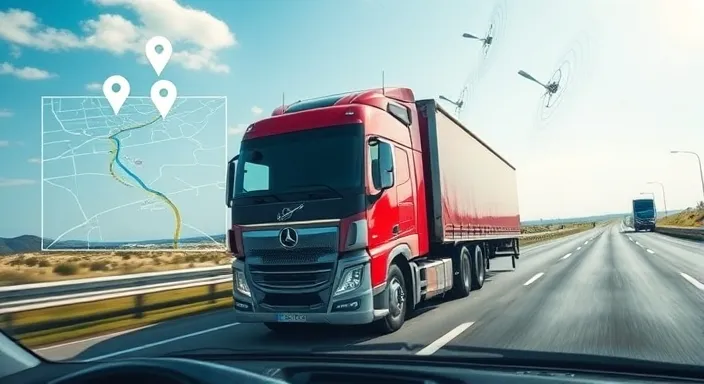GPS technology has affected practically every industry, but the transportation sector has significantly impacted it the most. Technology has made increased safety, fuel efficiency, fleet management efficiency, and regulatory compliance feasible. This is more than just a navigational aid anymore. How did GPS technology change the trucking industry? It increases safety in the transportation sector and aids in the observance of trucking laws.
How Safety in the Trucking Industry Has Increased Due to GPS Technology
Any trucking company’s top priority is safety. Either drivers avoid risky situations or they monitor their behaviors on the highway, but GPS technology has made some differences to bring in the much-needed change. Here are a few ways in which GPS technology has improved the safety of trucking services:
1. Live traffic updates and route optimization
GPS systems provide real-time information related to traffic conditions that include blocked roads, accidents, and construction zones. The system automatically diverts the trucks on other routes without any human intervention to avoid obstructions and follow safer routes; hence it minimizes the prospects of accidents or delays. The system also decreases the likelihood that drivers will take unknown dangerous roads, and they opt for safer routes provided by the GPS.
2. Driver Behavior Monitoring
Most of the GPS devices monitor trucker driving behavior, such as speed, hard braking, and acceleration rate. All this information will help fleet managers in finding hazardous driving behavior, taking corrective remedial measures, and hence ensuring that truck drivers follow the best safety practices. GPS also promotes safe speeds and standards of safe driving that involve fewer accidents.
3. Alerts due to Unhygienic Conditions
Some GPS systems give a driver information about weather conditions, say an ice road, fog, or strong winds. This way, the driver can change their driving behavior to keep themselves safe from those hazards.
4. Accuracy of tracking location
With the GPS technology, the truck can be followed at any point in an accurate location. The fleet manager is able to react on the spot if ever an emergency incident has occurred, as they can instantly call for assistance whenever their truck gets into an accident or any other incident.
Can the GPS Technology Help Lower Fuel Costs for Trucking Operators?
GPS is highly one of the ways it saves trucking companies money through reduced costs to its bottom lines in terms of lowered fuel costs. Fuel forms the major operating expense of any fleet. Even small increases in efficiency will have drastic savings. Here is how GPS works in terms of saving fuel costs:
1. Route Optimization
GPS helps the fleet managers optimize routes, taking real-time traffic data and road conditions into account. Trucks avoid congested areas, roadblocks, or inefficient detours; this reduces idle time and saves fuel. The fewer miles truckers drive, the less fuel they use, and therefore the more money they save.
2. Avoid Unnecessary Stops
In return, through actual real-time tracking by systems, real-time insight regarding vehicles enables truck movement oversight and the elimination of the need to stop at any place without value.
All this can cut fuel waste and vehicle-wear overspending, yet further and long-term expense reductions accrue over time.
3. Supervision on Fuel Consumption
Fuel-consuming activities for GPS-enabled trucks are generally equipped with live monitoring. Thus the fleet managers will be in a position to know which trucks consume how much and exactly when those inefficiencies of differences like idling much too long and fuel burnups occur.
With correction of that inefficiency and their respective improvement toward optimized fuel consumption savings.
4. Optimizing routes for long-haul trucks
GPS systems assist truckers in planning the most fuel-efficient routes for long-distance hauls. This will reduce distance traveled, cut down on the number of fuel stops, and help to avoid areas with heavy traffic, which reduces the fuel consumption.
How GPS Technology Helps in Compliance with Trucking Regulations
For trucking companies, it is critical in issues of managing the working hours for drivers, truck maintenance, and having high degrees of safety. It allows companies to follow countless rules, such as HOS, maintenance records, reports, etc. And here’s how GPS technology makes the difference for compliance:
1. Keeping track of HOS
One of the more stringent regulations is hours of service in trucking, which keeps a truck driver from being able to spend too many hours driving a truck during a cycle so as to avoid drowsiness. The ELD is fitted on GPS devices that track the number of hours driven automatically. It prevents the truck driver from exceeding his limited hours to drive and makes sure they take rest periods, making them reduce accidents brought on by drowsiness.
2. Vehicle Inspection Report
The GPS systems also allow for storing data on vehicle inspection, maintenance schedule, and repairs. On this, trucking companies will provide correct records to the regulatory authorities about the inspection, thus helping to maintain compliance with the standards of safety and prevention of fines
3. Simplification of Reporting and Documentation
The use of GPS technology in ensuring that all information required for auditing or inspection purposes will be captured and hence automating the record-keeping and reporting process. No more manual recording of hours as done by drivers, no more report of maintenance activities, hence less human error as well as compliance.
4. Avoidance of Penalties for Non-compliance
Since a driver is using HOS with the help of GPS monitoring, they will never overexert on the road. That saves them from not having to pay very costly penalties and fines. Logs that do not represent actual breaks can land somebody out of compliance. That risk is no more, given this use of GPS technology automatically tracks things in real-time.
Future of GPS Technology change the Trucking Industry
The trucking business will be advanced more as the GPS technology develops. Among the trends that are coming, which will determine the future of GPS technology change the trucking industry include:
1. Integration of AI and Machine Learning
This integration of AI and machine learning would provide GPS systems with advanced route optimization, predictive maintenance, and driver behavior analysis. The technology might even predict problems ahead of happening time, meaning further efficiency and safety will be achieved.
2. Autonomous Trucks
Autonomous trucks will be guided by GPS, entering the scene, whereas when autonomous technology becomes more mature, the vehicles are going to be guided via GPS on safe routes in optimized routes that ensure safe and reliable autonomous fleets.
3. Real-time data and analytics.
Future innovations in GPS technology include high-level data analytics and much deeper insights to the fleet managers about the actual vehicle performance, consumption, and behavior by the drivers. Hence, it will fuel a whole lot of further improvements in fleet management and logistics.
Conclusion
Such great scope of safety, the saving of the cost of fuel, and even complete compliance to laws that have revolutionized the trucking industry. Today, with real-time data access in terms of optimizing a route to monitoring the drivers’ behavior, therefore enhancing operations, such technological improvements regarding GPS are bound to occur with more and better developments; hence it paves a road toward efficient trucking, safer as well as cheaper for trucks in the near future.
Read more: How To Start A Transport/Delivery Business?
FAQ
The system has enhanced safety in that it keeps the drivers informed about the conditions on the roads, flow patterns, and sites of hazards. The system warns the drivers and makes them avoid dangerous routes as they are kept informed about some weather conditions or the road conditions that lead to accidents, and this enhances safety in general.
Absolutely. The GPS technology does optimize routes, avoid traffic, and it monitors fuel usage. Reduction of unnecessary idling with efficient routes can drastically make trucking companies reduce their cost on fuel.
The GPS technology ensures that such driving hours are automatically being tracked in terms of Hours of Service (HOS) regulations, and the right breaks are taken by truckers. It also has the ability to help them in accurate record-keeping for inspections and vehicles’ maintenance.





